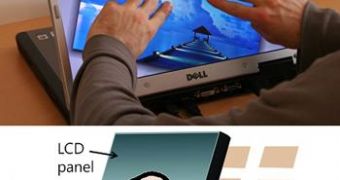A recent Wired piece reveals that Apple may just become king among multitouch tech vendors. The company behind the iPhone may force companies such as RIM, Nokia and Synaptics (who use pinch, swipe and triple tap gestures as control schemes for its devices) to say the tech is theirs, or worse, to give them up.
"If Apple's patent applications are successful, other manufacturers may have no choice but to implement multitouch gestures of their own," says Bryan Gardiner, of Wired. "The upshot: You might pinch to zoom on your phone, swirl your finger around to zoom on your notebook, and triple-tap to zoom on the web-browsing remote control in your home theater."
While some of the gestures aren't found with Apple's MacBook Air or iPhone, one gesture in particular, used for zooming in on text or an image (anything really) is something we might see a bit of a fight over. You guessed it, the pinch feature.
The burning question up on Wired is actually "Can Apple Patent the Pinch?" And while "experts say It's possible," this outcome is something many in the industry would rather avoid, since Apple stands a good chance of grabbing the patent:
"Synaptics, a company that by most estimates supplies 65 to 70 percent of the notebook industry with its touchpad technology, is working on its own set of universal touch gestures that it hopes will become a standard," the piece goes on. Such gestures include a circular motion that results in scrolling, a flip of the finger which allows to move pictures or documents and... (wait for it) zooming in or out by making a pinching gesture!
Raj Abhyanker, a patent lawyer who used to write patent applications for Apple, concludes it all: "If Apple's patents are granted, the company could absolutely stop others from using similar technology. They'd also be in an especially good position to stop others from including certain features. Apple could stop [their use] not only on mobile devices but also desktops."

 14 DAY TRIAL //
14 DAY TRIAL //